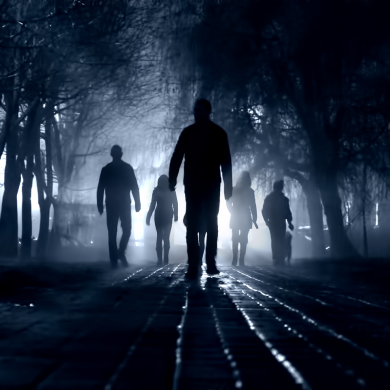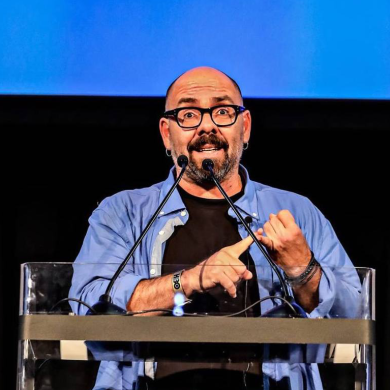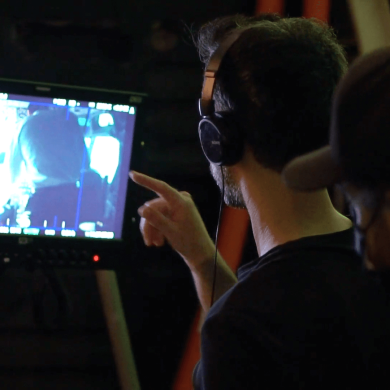By Justin Sanders
The best filmmakers combine technical mastery with an unrivaled ability to observe and articulate the human condition. Their gifts include a rare combination of craft and emotional sensitivity – two elements that happened to define Matthias Hoene’s childhood in Berlin.
His mother was an alternative medicine enthusiast with a holistic awareness of the human condition. His father was a scientist who specialized in “high-energy transmission tubes” that enable lasers to cut through steel.”
“Growing up, our dinner table conversations bounced between psychology and science,” Hoene told CreativeFuture from his home office in London. “Mix that in with regular tinkering and a certain kind of creative sensitivity can flourish.”
The tinkering occurred in “a little workshop in our basement where we would solder and screw and make stuff,” Hoene said. This “fun, handmade element” of their upbringing turned his two brothers into scientists themselves, but Hoene’s response landed somewhere on the other end of the spectrum. “I got into making movie posters as an artform,” he chuckled. “I don’t know why.”
Wherever the urge stemmed from, Hoene was all in. He left Berlin to study graphic design in London but quickly felt pulled away from film posters and toward the “practical problem-solving” inherent to filmmaking itself.
“I think that’s what’s so exciting about filmmaking,” Hoene said. “On one hand, it’s a form of engineering, of sticking things together with spit and glue. On the other hand, you’re striving to create a beautiful piece of art. This confluence of practicality and artistic endeavor is what makes filmmaking really unique.”
Not long after graduating, a friend from college recruited Hoene to assist with animating a music video. Soon, he was pitching his own music videos and before he knew it, was hired to direct one for the renowned DJ, Fat Boy Slim. “I was a German kid in London trying to make it as a music video director, with not much on my showreel,” he remembered. “But at the end of the day, if you had an idea that jumped off the page, you were getting a chance in London at that time. It was really hard because you were always up against a hundred other people, but if your idea was the best, you got the job.”
Hoene not only had good ideas, he had at that ephemeral quality that can’t really be taught – style. Growing up, his cinematic appetite fluctuated between a certain strain of droll horror-comedy emphasized by Peter Jackson’s Dead Alive and Sam Raimi’s The Evil Dead series, and taut, clinical thrillers in the vein of Michael Mann’s The Insider. When he began making films himself, both influences were readily apparent from the get-go, starting with the first commercial he ever directed – a spot for the now-defunct singles-oriented travel company, Club 18-30.
Hoene landed the gig after his video for Fat Boy Slim led to signing with the world renowned production company, Partizan, who got him to pitch on the project. “I had no idea what I was doing,” he remembered, but inexperience could not dilute his talent. The commercial, a series of vignettes featuring dogs in various states of, to put it gently, physical intimacy, is silly, even crass. But Hoene’s style adds something special to the proceedings. There is a quality to his gaze that feels unflinching yet giddy, reveling in animalistic carnality while also honoring it with unfailing precision. It’s somehow both winking and deadly serious, and it elevates the material to sublime comedy.
Club 18-30 has since shuttered, but this commercial – again, Hoene’s first out of the gate – might live on forever. Upon release, it was submitted to the Cannes Lions International Festival of Creativity where it won a Golden Lion – perhaps advertising’s highest honor. “After that, many people were asking to see my reel,” Hoene said, “which I didn’t have at the time because I had only done a couple music videos and the one commercial. But it launched me as a commercials director.”
Hoene never looked back. With residences in both Los Angeles and London, he is today an in-demand director of commercials and music videos. It’s a “very fast-moving” profession, he said. “Sometimes you can feel like you’re on a hamster wheel.” The job can get hectic, but he enjoys the travel, it’s a good living, and “it’s nice to have projects to work on in between longer productions such as films and television shows, which can take a very long time to come to fruition.”
Early in his career, Hoene was “trying all sorts of things,” as he worked to establish a sustainable filmmaking career. He dabbled in animation, directed a documentary about bullying for a British mental health institution, and produced a web series for the social media platform of the moment, Myspace. Today, that series is collecting dust in some far corner of the internet, but at least one element of it proved surprisingly fruitful: the presence of three Cockney actors who began the project with small supporting roles only to prove themselves worthy of something far greater.
“They were so funny and kept ad-libbing all these scenes, to the point where they ended up becoming one-third of the whole series,” Hoene said. “I said to my producer, ‘These Cockneys need to have their own project.’”
It occurred to Hoene that, within his preferred genres of horror and science-fiction, there were no movies featuring elderly characters like those Cockneys. He began brainstorming premises that could buck this unfortunate trend. “Cockneys vs. Aliens would be too expensive,” he said, “and Cockneys vs. Werewolves would require too much bad CGI. But Cockneys vs. Zombies? That seemed like the perfect fit.”
At the time, Hoene wasn’t entirely serious about his proposed concept. He was just “having some fun,” he said. “But, a week later, my producer called me and said, ‘We have interest in a Cockneys vs. Zombies film.’”
Exemplifying how much slower film production moves than commercials, the excitement from this news quickly dampened as Hoene and two screenwriters, James Moran and Lucas Roche, proceeded to spend another year and a half developing the screenplay. In the end, Hoene persevered. He made his vision a reality, and it has everything you would hope for in a film about nursing home residents taking on hoards of the walking dead.
Hoene’s comedic touch is as deft as ever in Cockneys Vs. Zombies, but the project also let him flex some serious action chops, which would serve him well on his next full-length movie, the Chinese action-adventure epic, Warrior’s Gate. The film was co-produced and co-written by the troubled but influential prolific French film empresario, Luc Besson, who hired Hoene after sifting through more than 100 showreels from other directors.
“Besson was looking for a young, European film director who could do comedy and action,” Hoene said, “and it actually isn’t so easy to find European directors who have experience in both those genres at the same time. He saw my reel and invited me to pitch my take to him, and a week later I was on a plane to China for preproduction.”
Warrior’s Gate was on a scale much bigger than anything Hoene had done to that point in his career. “There were days when there were 900 people on set, most of whom did not speak my language,” he said. “It was a 72-day shoot with enormous set pieces and special effects, but I was oddly comfortable with it all thanks to my commercial work, which can often entail a similar scale just in a shorter duration of time.”
Besson clearly sensed this confidence. “He threw me in there and said, ‘Hey, make your film,’” Hoene said. “The only thing he was really worried about was that my British sense of humor would infect the piece too much. I figured that if I, a German, could fool someone like him into being worried about my British sense of humor, that I would be okay.”
Hoene was definitely okay, despite the fact that making a film in China, he said, is “the hardest thing a filmmaker who is not Chinese can do.” There are cultural barriers, linguistic barriers, and regulatory barriers at every twist and turn. “Once I came out of that project, I felt much more confident in my ability to make virtually anything,” he said. “Working on smaller productions now, with smaller crews, is almost a breeze in comparison.”
Warrior’s Gate is larger than life and immaculately constructed. It proves that Hoene is capable of operating the machinery of a giant blockbuster production. But whatever opportunity will call next, he also likes the creative freedom of mid-range projects and has shown he’s fully capable of turning smaller budgets into something extraordinary.
Though he has enjoyed success at the highest levels, Hoene is still the same tinkerer he was as a kid in his parents’ basement. He simply enjoys making films, wherever and however he can. When the pandemic struck, he didn’t let the lapse in production slow him down. He got out on the streets and, entirely on his own, made a series of eerily beautiful short films that capture life in this moment with haunting clarity.
“I just felt a need to make some sense of this time we’re living in,” Hoene said. “To create a document of what my city looks like right now, because it’s quite unprecedented. You get up and go outside and the empty streets look like scenes in the film 28 Days Later. It was a chance to record a side of London we might never see again, so I just took a week, got up each day, and went out with a camera and a tripod, setting up whenever I stumbled across something interesting.”
Hoene’s advice for young filmmakers is to embrace a similar mentality – just get up each day, go out with a camera, and make something. “It’s not about the money and you shouldn’t let money stop you from making films,” he said. “The word is filmmaker – it’s not film dreamer or film talker. You can get friends together now and make a feature film on an iPhone. The only thing stopping you from doing it is you.”
Amidst the horrors of coronavirus and a painful but long overdue collective awakening to systemic racial injustice in America, Hoene sees an opportunity for the entertainment industry to expand its horizons and bring new voices into the fold.
“When I was a German kid in London, trying to make it as a music video director, I got the job if my idea was the best,” he said. “That should be the case for everyone who tries to work in this industry. Everyone should be given the opportunity to fight for a job. No decisions should be made on the basis of people’s background. It’s really important that we all make a much more concerted effort to have more female and multicultural voices working as crewmembers, directors, writers, producers, and other roles across the board.”
This process does not just involve improved hiring and training practices, he continued. The storytellers have a role to play as well.
“When you develop a project now, you always think about diversity and trying to better reflect our society today,” Hoene said. “Everyone’s learning and I think we’re all on a growth journey together of trying to tell better stories that everyone can identify with.”



